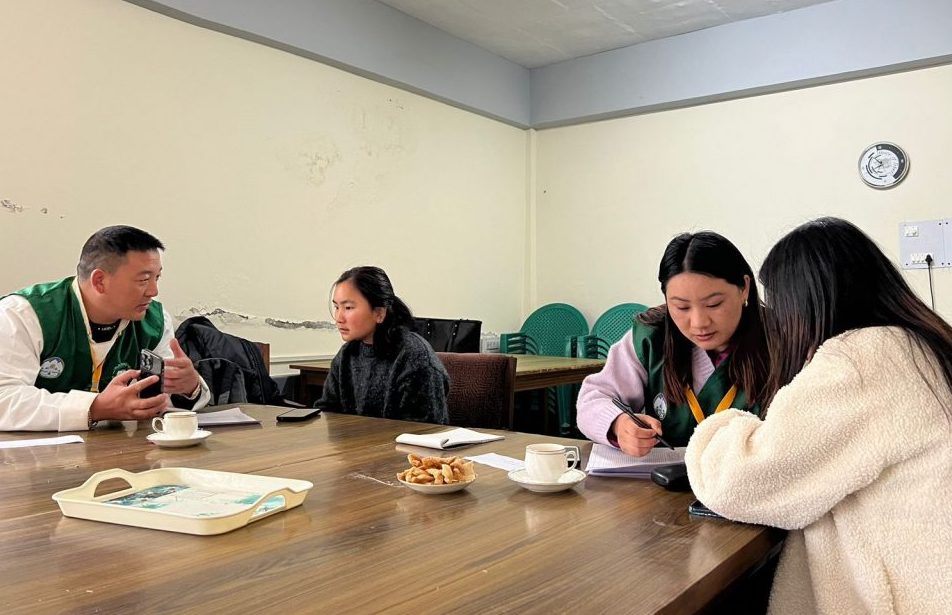By Tenzin Nyidon
DHARAMSHALA, March 15: The ongoing initiative by the current administration to gather comprehensive data of the exile Tibetan community through the ‘Household Listing Survey 2024’ was a much discussed topic in the ongoing sixth session of the Tibetan Parliament in Exile.
The larger chunk of the discourse argued the relevance of questions in the survey, including queries about educational background, financial status, the count of family members living abroad, and property ownership, as it bordered on safety as well as privacy of people, according to some MPs. However, some MPs argued that data forms the backbone of any strategic planning and policy thereafter by the administration and hence a much needed component of good governance.
MP Geshe Monlam Tharchin on Wednesday, referenced a book authored by former Kalon Tashi Paljor, alleging clandestine meetings with Chinese officials wherein they purportedly requested lists of Tibetans residing outside Tibet to facilitate resettlement within Tibet. This assertion, widely disseminated within the Tibetan community, has reportedly dissuaded many from participating in the survey, according to him. In response, the Sikyong clarified that the survey’s data serve the welfare of the general populace and the upcoming Kashag, explicitly stating that it is not intended to be shared with the Chinese government in any capacity.
MP Geshe Lharampa Gowo Lobsang Phende highlighted the potential danger to the lives of family members residing in Tibet if their details were needed in the survey. Sikyong Penpa Tsering highlighted that upon the formation of the current Kashag (Cabinet), their primary aim was to ascertain the demographic composition of Tibetans in exile. He emphasised that while it is within the discretion of the general public whether to disclose personal data, it is imperative they accurately report the count of their family members for accurate data.
During the fifth day of the sixth session, the discussion regarding the CTA’s Household Listing Survey persisted, with MP Dhondup Tashi highlighting the significance of conducting the survey to ascertain the demographic count of Tibetans in exile. He stated that it is important for the forthcoming Kashag, emphasising the potential benefits for the general public in future CTA projects. Dhondup Tashi noted that providing personal information was not a significant concern, as such data had already been shared by Tibetan refugees with the Tibetan Reception Centre in Nepal and documented in the Green Book.
MP Khenpo Kada Ngedup Sonam also raised doubts regarding the survey’s main objective, noting that it seemed to focus excessively on financial circumstances and property ownership based on his observations. In addressing the query, Sikyong clarified that inquiries about financial situations are inherent in demographic surveys to provide a comprehensive understanding of the circumstances faced by Tibetan exiles from a financial standpoint. He drew parallels between this survey and similar ones conducted in other nations. “Understanding the financial status of Tibetan exiles is crucial for assessing whether future assistance will be necessary or if they are self-sufficient,” he emphasised.
MPs Lobsang Gyatso Sither and Tenzin Choezin voiced their support for the survey, suggesting a broader perspective be taken in view of planning and policy formation for the administration despite some inhibitions faced by the public, arguing that without data of the target subject, any and all planning will be rendered ineffective and inefficient.
The Sikyong Penpa Tsering emphasised the importance of honesty among the general populace when completing the survey. He urged individuals who cannot afford to be honest to refrain from participating altogether, as their dishonesty would compromise the overall credibility of the survey and hinder future initiatives of the CTA. Sikyong reiterated that the primary objective of the survey is to benefit the community as a whole.
Over 80,000 Tibetans, including over 60,000 in India and over 20,000 in the west have taken part in the ongoing ‘Household Listing Survey 2024’ of the CTA till date.











4 Responses
Data are backbone to plan any future projects, without data how we can analysis and plan of future.
Certainly:
It’s understandable to feel concerned about the personal nature of questions asked in the CTA household listing survey, such as monthly income and property ownership. These inquiries may seem intrusive and potentially violate privacy boundaries, particularly for foreign citizens. There’s a valid concern that such extensive data collection may breach international laws governing the privacy rights of individuals, especially when conducted by non-governmental organizations like CTA.
Evaluating the legality of collecting such data within the framework of applicable laws and regulations is crucial, as these standards can vary by jurisdiction. Additionally, ensuring robust security protocols to safeguard collected data is paramount, given the potential risks associated with unauthorized access or misuse.
Considering the implications, it might be prudent for organizations like CTA to reassess their data collection practices. Focusing on more relevant and less intrusive metrics, such as ownership of green books, could still provide valuable insights without compromising privacy. Redirecting resources towards initiatives benefiting disadvantaged communities aligns with principles of social responsibility and could yield more impactful outcomes.
By refining data collection strategies and prioritizing the protection of individuals’ privacy rights, organizations like CTA can better serve their intended beneficiaries while upholding ethical standards and legal obligations.
Precious time was wasted by ignorant few regarding census. Resolve the pressing issues of appointing Chief Justice and reforming the constitution to function the exile government.
Chinese govt can easily hack into the Tibetan govt database where family information are stored, and jeopardize safety of the individuals. if they can hack into USA computers, they can easily penetrate CTA computers.